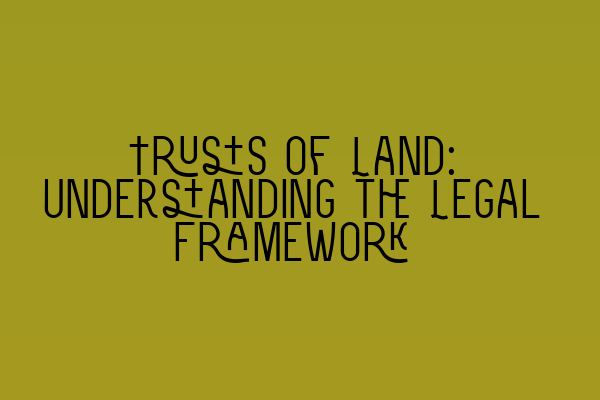Trusts of Land: Understanding the Legal Framework
Welcome to SQE Property Law & Land Law’s blog post on understanding the legal framework of Trusts of Land. In this post, we will dive deep into the concept of Trusts of Land, explaining the key elements, legal principles, and practical implications of this area of law. Whether you are a law student preparing for SQE 1 or SQE 2 exams, a legal professional looking to refresh your knowledge, or simply someone interested in property law, this post will provide you with a comprehensive understanding of Trusts of Land.
At SQE Property Law & Land Law, we understand the importance of staying updated with the latest legal developments and having a strong foundation in key areas of law. We offer SQE 1 and SQE 2 preparation courses, as well as practice exam questions and mocks to help you enhance your legal knowledge and achieve success in your exams. Check out our related articles for more information:
– [SQE 1 Practice Exam Questions](https://fqps.co.uk/sqe/sqe1-preparation/mcq-practice-quiz)
– [SQE 1 Practice Mocks FLK1 FLK2](https://fqps.co.uk/sqe/sqe1-preparation/practice-mocks-quiz)
– [SQE 2 Preparation Courses](https://fqps.co.uk/sqe/sqe2-preparation)
– [SQE 1 Preparation Courses](https://fqps.co.uk/sqe/sqe1-preparation)
– [SRA SQE Exam Dates](https://fqps.co.uk/sqe/sqe1-sqe2-exam-dates)
Now, let’s delve into the fascinating world of Trusts of Land.
1. Introduction to Trusts of Land
Trusts of Land are legal arrangements where one person, known as the trustee, holds the legal ownership of a property for the benefit of another person, known as the beneficiary. The trustee has a legal duty to manage the property in the best interests of the beneficiary, exercising their powers and duties within the framework of the relevant trust deed or legislation.
2. Legal Principles of Trusts of Land
The legal principles governing Trusts of Land are primarily derived from the Trusts of Land and Appointment of Trustees Act 1996 (TOLATA). TOLATA provides a framework for the creation, administration, and disputes related to trusts of land. Understanding the key legal principles outlined in TOLATA is crucial for anyone dealing with trusts of land matters.
3. Creation of Trusts of Land
A trust of land can be created in a variety of ways, such as through a written trust deed, implied trust, constructive trust, resulting trust, or by operation of law. It is essential to carefully consider the requirements for creating a valid trust of land and ensure compliance with the legal formalities.
4. Trustees’ Duties and Powers
The trustee has a fiduciary duty to act in the best interests of the beneficiary. This duty includes managing the property efficiently, maintaining it, and making decisions regarding its use, occupation, and disposal. Trustees are also entrusted with significant powers, such as the power to sell, lease, or mortgage the property, subject to any restrictions or conditions specified in the trust instrument.
5. Beneficiaries’ Rights and Claims
Beneficiaries of a trust of land have certain rights, including the right to occupy the property, receive the income, and participate in decisions regarding the property. Beneficiaries can also make claims to vary or terminate a trust, which may arise due to changed circumstances or disputes between beneficiaries.
6. Disputes and Resolutions
Disputes can arise in trusts of land matters, often relating to issues of ownership, beneficial interests, breaches of trust, or disagreements between beneficiaries. Various mechanisms, such as negotiation, mediation, or litigation, can be used to resolve these disputes and provide a fair and just outcome for all parties involved.
7. Practical Considerations for Trusts of Land
When dealing with trusts of land, it is essential to consider various practical aspects, such as tax implications, conveyancing processes, and the impact of other legislation, such as the Family Law Act 1996. Seeking professional advice from a solicitor experienced in trusts of land matters is crucial to ensure compliance with legal requirements and to protect the interests of all parties involved.
Conclusion
Trusts of Land form an integral part of property law, providing a legal framework for the management and administration of properties held for the benefit of others. Understanding the legal principles, duties, powers, and practical considerations involved in trusts of land is essential for legal professionals and individuals dealing with property matters.
At SQE Property Law & Land Law, we offer comprehensive SQE 1 and SQE 2 preparation courses, practice exam questions, and mocks to help you prepare for your exams and succeed in your legal career. Stay updated with the latest legal developments by exploring our related articles.
Trusts of Land offer a fascinating area for legal study, combining principles of equity, property law, and fiduciary duties. By comprehending the legal framework and practical implications of trusts of land, you can navigate this complex area with confidence and expertise.
Remember to visit our website for more information on our SQE preparation courses and resources. Good luck with your studies and exams!
Keywords: Trusts of Land, legal framework, SQE 1, SQE 2, TOLATA, trustee, beneficiary, legal principles, trust deed, fiduciary duty, powers, beneficiaries’ rights, claims, disputes, resolutions, practical considerations, property law.
